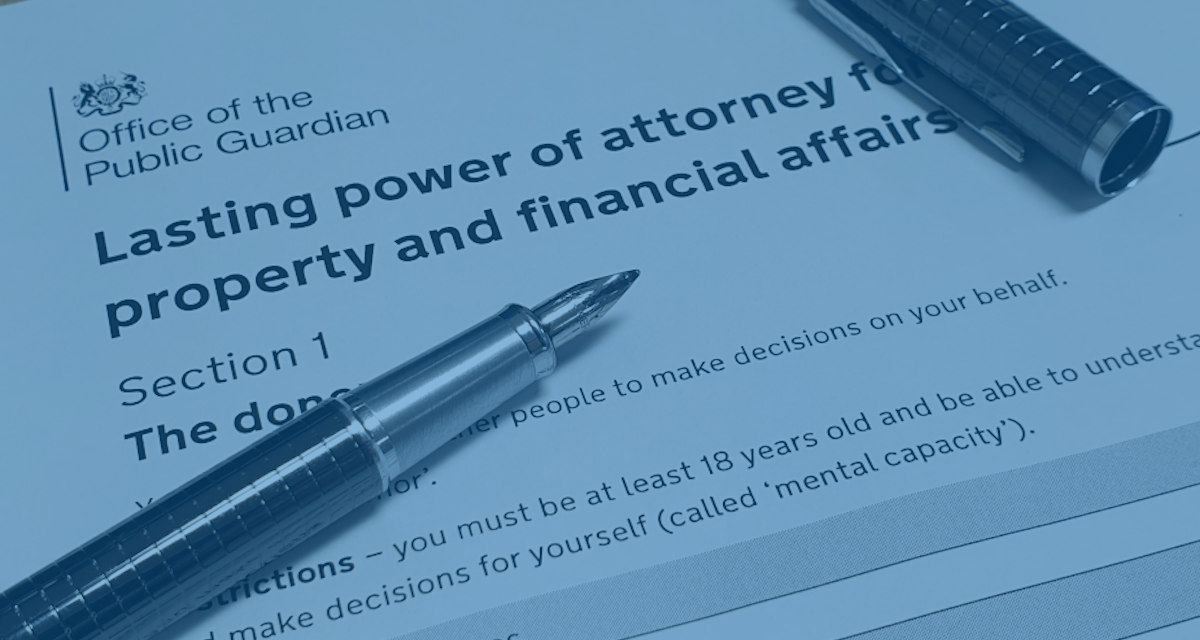Properly signing a Lasting Power of Attorney (LPA) is possibly the most common part of the process of creating an LPA for errors. This is due to the order an LPA needs to be signed, but errors could also be caused by other factors. In this article, we are going to look at alternative methods and scenarios of the donor signing their LPA.
The donor is blind
If the donor is blind, but can still sign or make a mark, there is not much difference from the regular signing process. The only exception is that the donor would need to be guided to sign in the correct place and the terms of the LPA, including the legal rights and responsibilities in section 8, would need to be read to the donor. While reference of this is not required in the LPA, it would be advisable that reference to the donor being blind is noted with the instructions with details of the donor signing the LPA.
Making a mark
In some cases, the donor might not be able to write their own signature. If they are able to hold a pen long enough to leave a mark in the signature box unaided, this will be an acceptable form of signature for the LPA to be valid. The donor must ensure that he/she has done this in the presence of an independent witness.
It is advisable that if the donor has difficulties in writing their signature that they are encouraged to do so. However, if this is not possible the OPG would require a written explanation detailing that the donor can only leave a mark.
The donor cannot sign or make a mark
If the donor is unable to sign or make a mark, the final option available to them is to request someone to sign on their behalf. Guidance from the OPG on this is vague, but there are some points that are clear:
- Continuation sheet 3 must be completed and used instead of section 9. Therefore, this page must be signed first.
- The person signing on behalf of the donor must:
- be over the age of 18,
- only sign on the donors instruction, and
- cannot be a witness in the LPA.
- Signing must also be in the presence of 2 witnesses, and:
- the witnesses must be over the age of 18,
- the witnesses cannot be attorneys appointed in the LPA,
- the certificate provider can be a witness, and
- a notifying person can be a witness.
If you are taking instructions for a donor that cannot sign or make a mark, you will need to inform us of this as soon as possible to allow us to prepare Continuation Sheet 3. We will also require the details of a person signing on behalf of the donor.


 © Trust Wills & Probate Limited t/a WillPack. All rights reserved.
© Trust Wills & Probate Limited t/a WillPack. All rights reserved.
2 comments
Darren
8 December 2022 at 8:31 pm
My father suddenly and unexpectedly became paralysed from the neck down and we are setting up a joint power of attorney on his behalf with myself, my brother and his partner as attorneys. As he is unable to sign or make a mark, someone else will need to sign on his behalf. My question is this, can the person signing on behalf of the donor be a close relative of one of the nominated attorney’s? We were hoping that my fathers partners son could sign on his behalf, but we are worried that this might cause a “conflict of interest”. Any help would be much appreciated.
WillPack
8 December 2022 at 9:28 pm
Please note that we are only insured to provide advice to our partners. If you require any advice we would recommend contacting the Society of Will Writers on [email protected] or 01522 687888 who will be able to put you in contact with a will writer local to you.
Comments are closed.